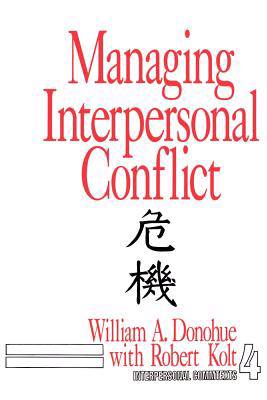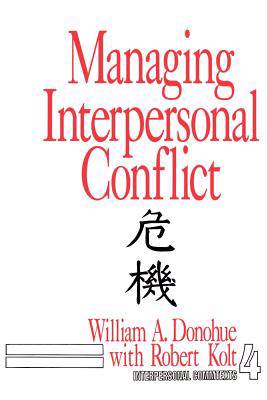
- Afhalen na 1 uur in een winkel met voorraad
- Gratis thuislevering in België vanaf € 30
- Ruim aanbod met 7 miljoen producten
- Afhalen na 1 uur in een winkel met voorraad
- Gratis thuislevering in België vanaf € 30
- Ruim aanbod met 7 miljoen producten
Zoeken
Omschrijving
Managing Interpersonal Conflict helps readers better understand and ultimately manage their routine interpersonal conflicts. Specifically, the book walks readers through the conflict process--from the initial decision of whether or not to confront differences to how to plan the actual confrontation. Donohue deals extensively with the negotiation process and, if negotiation proves unsuccessful, with third-party dispute resolution. The book emphasizes keeping conflicts under control and keeping focused on the issues. The key to managing conflict is to address differences collaboratively so parties can create better solutions and, ultimately, strengthen their relationships. Managing Interpersonal Conflict prepares and encourages the reader to stop avoiding their conflicts and start confronting them. Designed for college and university undergraduates, Donohue′s text and the Interpersonal Commtext series will also interest students and professionals in management studies, sociology, organization studies, and social psychology. "They provide a very useful look at a somewhat broader than usual range of conflict issues. . . . Where the decision is to confront, it offers useful approaches to allowing face saving and to issue structuring that will allow the conflict, in many cases, to be readily resolved. . . . The second section . . . provides a useful and easily worked with framework for negotiating, and deals most effectively with the use of and responses to the exercise of power in the negotiation context. . . . The book is exceptionally readable and effective in its presentation of approaches to conflict. While it is not a traditional academic text, periodic references to the conflict literature are used to allow the reader to examine the issues presented in more depth. The book will serve as an outstanding text for a training program in conflict management and can also be used by an individual effectively to learn these techniques." --The Alternative Newsletter
Specificaties
Betrokkenen
- Auteur(s):
- Uitgeverij:
Inhoud
- Aantal bladzijden:
- 171
- Taal:
- Engels
- Reeks:
- Reeksnummer:
- nr. 4
Eigenschappen
- Productcode (EAN):
- 9780803933125
- Verschijningsdatum:
- 1/07/1992
- Uitvoering:
- Paperback
- Formaat:
- Trade paperback (VS)
- Afmetingen:
- 161 mm x 224 mm
- Gewicht:
- 299 g

Alleen bij Standaard Boekhandel
+ 558 punten op je klantenkaart van Standaard Boekhandel
Beoordelingen
We publiceren alleen reviews die voldoen aan de voorwaarden voor reviews. Bekijk onze voorwaarden voor reviews.







